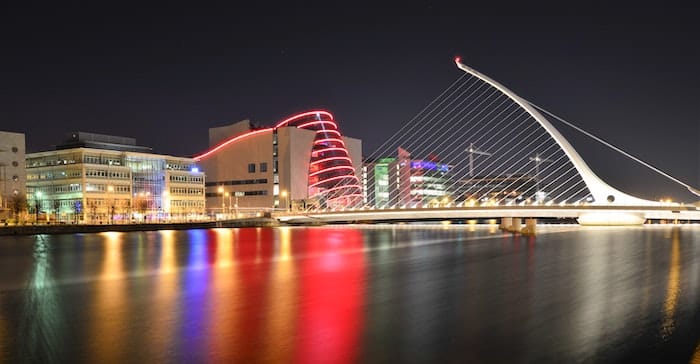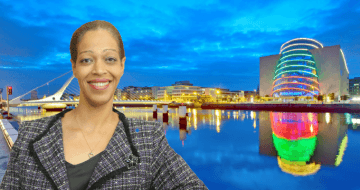Partners from A&L Goodbody, Arthur Cox, Eversheds, Matheson and McCann Fitzgerald join an expert in legal education from BARBRI to discuss Ireland’s position as a global hub in the post-Brexit economy and the opportunities arising for lawyers and students alike

At Legal Cheek’s latest virtual event, ‘How to build an international legal career in Ireland’, lawyers from firms with a significant presence in Ireland, A&L Goodbody, Arthur Cox, Eversheds Sutherland, Matheson and McCann FitzGerald, joined a legal education expert from BARBRI, to discuss the opportunities arising for lawyers and students in the country’s booming legal market.
The speakers
• Brian O’Malley, partner in the restructuring & insolvency team and graduate talent partner at A&L Goodbody
• Aaron Boyle, partner and head of infrastructure, construction & utilities at Arthur Cox
• Enda Cullivan, partner in the corporate team at Eversheds Sutherland
• Emma Doherty, partner and member of the US business and inward investment groups at Matheson
• Laura Deignan, partner in the finance team at McCann FitzGerald
• Chris Jorgenson, senior director of institutional partnerships at BARBRI
1. Ireland’s place in the global legal market
The trend of international law firms setting up shop in Ireland shows no signs of slowing — with the likes of DLA Piper, Dechert and most recently, Addleshaw Goddard, all extending their operations into Dublin, the Irish legal market is rapidly expanding. Enda Cullivan, partner in the corporate team at Eversheds Sutherland, observed that because of this, “the market for traineeships is different now to when I was starting out — and in ten years, it will probably look very different to how it does now”. Although the influx in international outfits entering Ireland is creating increased competition, Aaron Boyle, partner and head of infrastructure, construction and utilities at Arthur Cox, did not believe this spelled danger for independent domestic firms. When international firms come to Ireland, “the hardest thing to replicate is domestic expertise in very specialist areas”, which Irish firms focus on. We are “at the cutting edge and top of our game in these key areas”, Boyle explained to the virtual audience of over 150 students.
The attraction to Ireland is not limited to law firms only, but to their clients too. Laura Deignan, partner in the finance team at McCann FitzGerald, noted that companies within the aviation sector are drawn to Ireland due to its low corporation tax rates. And yet, despite Ireland’s agreement to raise its rate — from 12.5% to 15% — Deignan was hopeful that this move would not deter companies from setting up in Ireland. She observed that “the corporation tax is one part of the puzzle of why Ireland is so attractive but it’s not just that”.
2. Going for growth
With the pandemic slowing down some sectors, the panel were asked to consider areas they anticipated growing over the next five years. Deignan offered ESG and sustainability, funds and aviation as sectors which would only continue to grow. But for Brian O’Malley, partner in the restructuring & insolvency team and graduate talent partner at A&L Goodbody, “it would be remiss not to factor restructuring and insolvency into what the economic cycle will look like in the next five years”. With governments providing support for businesses throughout the pandemic — a crucial lifeline for some — once this is removed, this is likely to affect the restructuring and insolvency landscape as the effect “works its way through the system”, O’Malley explained.
This expansion of the Irish legal market will also create opportunities for aspiring lawyers. For Chris Jorgenson, senior director of institutional partnerships at BARBRI, there is “nothing indicating anything but continued growth” of training opportunities for aspiring lawyers in Ireland.
3. The Brexit benefit
When asked to consider the effects of Brexit, Deignan commented that the concerns in the market that were anticipated had been yet to materialise. She observed that it was “business as usual, albeit with a few bumps in the road”. These bumps, namely shifts to practical considerations in a transaction, did not however give rise to any “major hold on deals or anything we’ve been doing”, she added.
Further, O’Malley remarked that though the long-term effects are still uncertain, “Brexit, in a sense, has actually been good for jurisdictions like Ireland and France in terms of the relocation and re-domestication of some lines of business”. This includes the insurance and banking sectors as well as “some movement to the passporting of funds”, he explained. Another benefit O’Malley said Brexit has brought to his sector, is the increase in the Irish judiciary’s openness to embrace complex matters that would have been unfamiliar to the jurisdiction only a few years prior. The jurisprudential value brought by these cases “is pushing Dublin’s confidence in saying that we are a jurisdiction that you can restructure complex and high value deals”, he told the virtual audience.
We are live at 'How to build an international legal career in Ireland – with @ALGTrainees, @ArthurCoxLaw, @ESlawIE, @MathesonLaw, @McCannFitz and @barbri'. On the agenda for the panel discussion: pic.twitter.com/K6JQEkOkQD
— Legal Cheek (@legalcheek) February 10, 2022
4. Agile working
With Covid restrictions in Ireland easing, and offices opening up again, the future world of work is a key consideration among law firms. Emma Doherty, partner and member of the US business and inward investment groups at Matheson, revealed that remote working had already been part of the firm prior to Covid, so the shift was “seamless”. But she also admitted that the inability to work through things together in-person and the process of “learning by osmosis” (the idea that junior employees pick up information from their seniors when immersed in the office) presented some challenges.
However, overall, she felt that the pandemic had “kickstarted a whole transformation in the legal industry and I don’t think we’re ever going back”. Doherty added that the change to the delivery of services, the training of people and the way people work together was here to stay. This transformation has brought legal professionals more in line with their clients and that has, in turn, brought these relationships closer.
5. Dual qualification
Dual qualification, which provides lawyers with the ability to practise law in two jurisdictions, is a process that requires time commitment and requires sitting often very intense examinations. However, obtaining that second qualification comes with benefits that should not be overlooked. For Jorgenson, from his experience as a dual-qualified lawyer himself, “it broadened my skillset as a lawyer and practitioner”. He further added that it can help aspiring lawyers as they search for employment — it can distinguish an individual from other candidates in the recruitment process. Overall, Jorgenson summarised that “if you are looking to be an international practitioner or even work in international-facing practice areas, it stands to reason that dual qualification can be very useful and can put you in a good position to advise in those areas”.
About Legal Cheek Careers posts.


